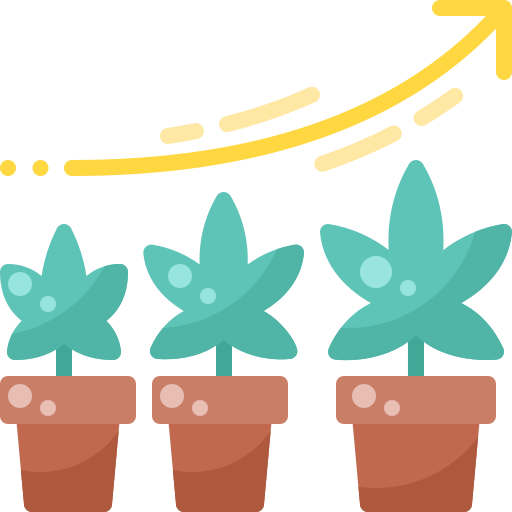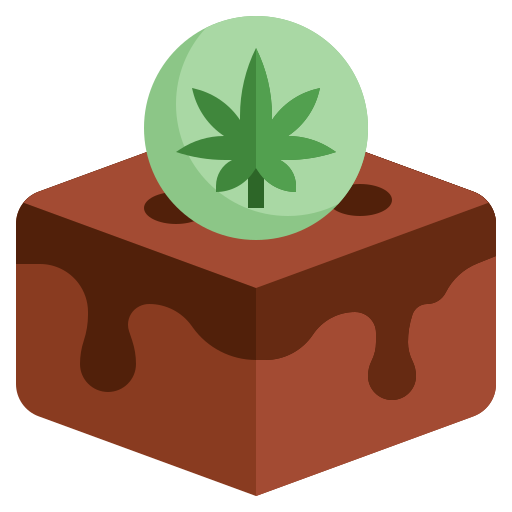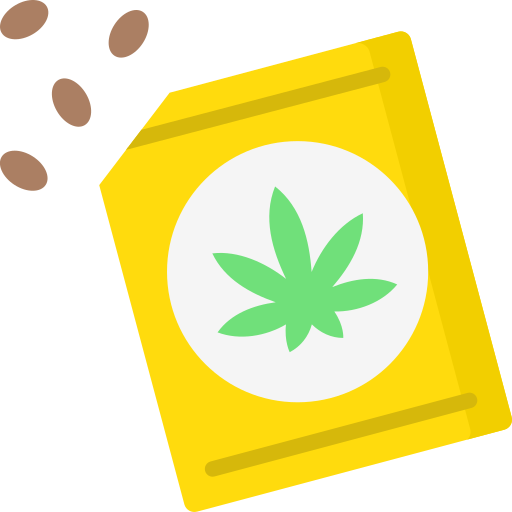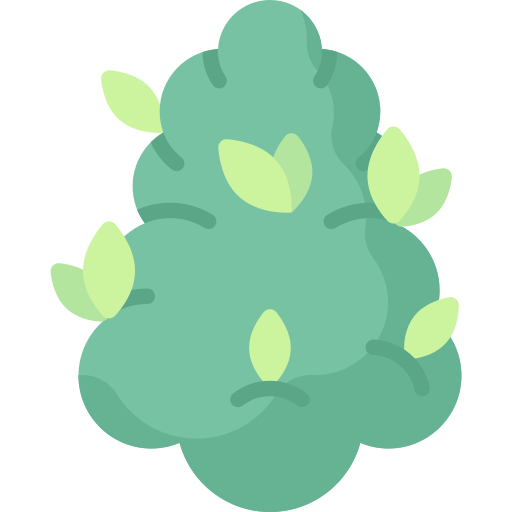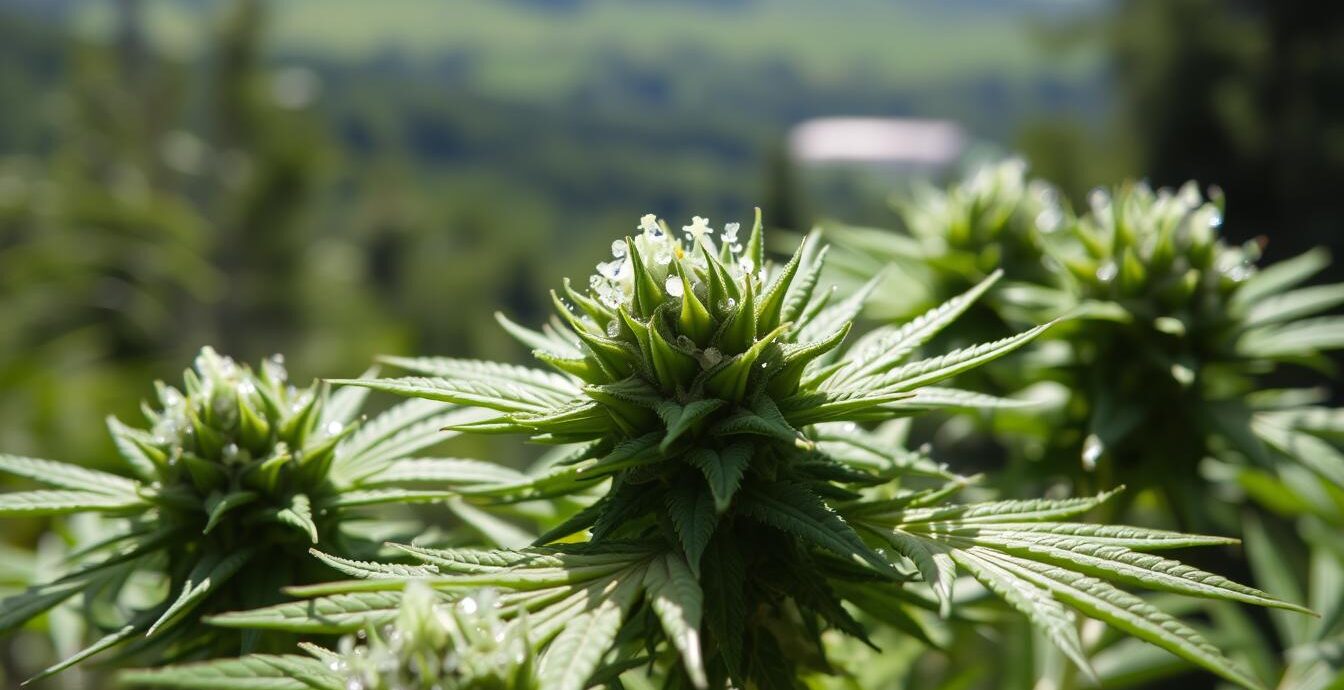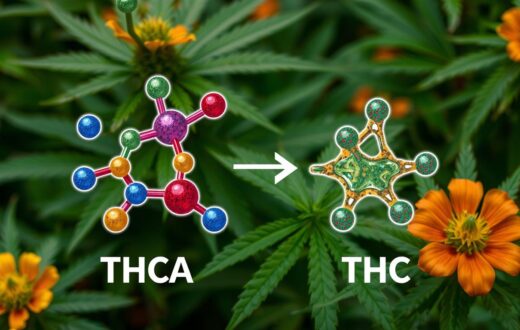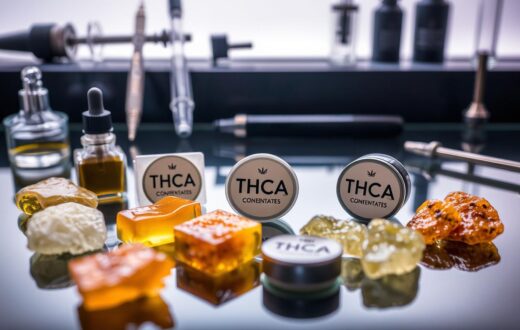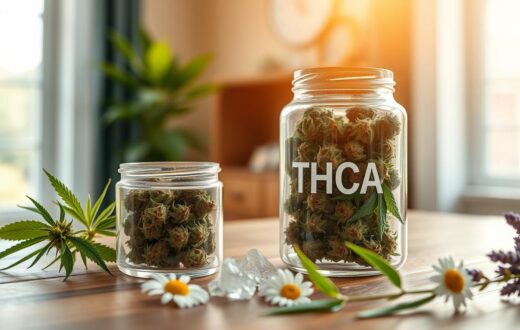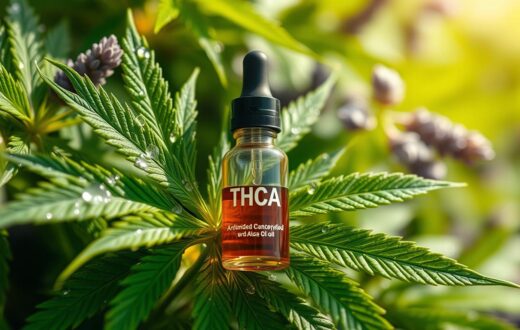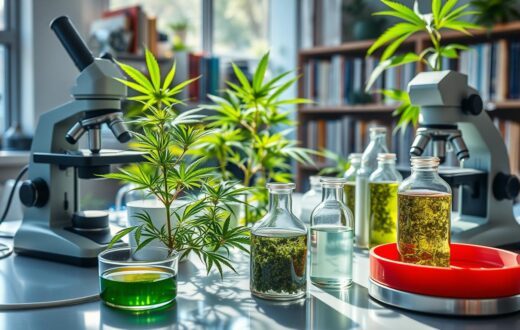Ever wondered why your raw hemp smoothie doesn’t give you a buzz? The answer lies in a fascinating compound called THCA. But what exactly is THCA, and how does it relate to the hemp we know and love?
Hemp is celebrated for its versatility and health benefits. It’s more complex than we think. While it’s defined as cannabis with less than 0.3% THC, it holds a treasure trove of compounds. THCA is a key player in the hemp analysis world.
Exploring hemp compounds shows THCA is common in both cannabis and hemp plants. It’s especially found in fresh, unheated plant material. This non-intoxicating precursor to THC has caught the attention of researchers and consumers. It’s prompting a closer look at its potential benefits and legal status.
As we explore THCA in hemp, we’ll dive into its chemical nature, legal standing, and health implications. Join us on this journey through the world of cannabinoids. We’ll separate fact from fiction and shed light on this lesser-known compound.
What is THCA?
THCA, or tetrahydrocannabinolic acid, is a key compound found in hemp extracts. It’s a non-psychoactive cannabinoid that plays a crucial role in the cannabis plant’s lifecycle. THCA is abundant in raw hemp plants but transforms into THC when exposed to heat.
Definition of THCA
THCA is one of many cannabinoids present in hemp plants. It’s the precursor to THC, the well-known psychoactive compound. In its natural state, THCA doesn’t produce intoxicating effects. This makes THCA-rich hemp products popular among those seeking potential benefits without the high.
Difference Between THCA and THC
The main difference between THCA and THC lies in their effects on the body. THCA remains non-psychoactive until it undergoes decarboxylation – a process triggered by heat. When you smoke or vape THCA hemp flower, it converts to THC, producing similar effects to traditional cannabis. This transformation is why some states have concerns about THCA products, despite their initial non-intoxicating nature.
Understanding THCA is crucial for navigating the complex world of hemp products. While THCA offers potential benefits like anti-inflammatory properties, its legal status varies. The 2018 Hemp Farm Bill allows THCA hemp flower with less than 0.3% Delta-9 THC, but regulations differ across states. As research continues, THCA’s role in the cannabis industry remains a topic of interest and debate.
Legal Status of THCA in the United States
The laws about THCA in hemp are complex and different in each state. The 2018 Farm Bill made hemp legal if it has less than 0.3% THC. But, it doesn’t clearly say how THCA fits into this rule.
Federal Regulations
At the federal level, THCA is part of the THC count in hemp. The DEA says THCA isn’t legal hemp because it can turn into THC when heated. This rule affects how hemp is grown and sold across the country.
State Variations in Legality
State laws on THCA are all over the place. Most states follow federal rules, but seven states have their own rules. These states are Arkansas, Minnesota, Oregon, Rhode Island, Idaho, New Hampshire, and South Dakota.
Some states let people use THCA products for both medical and recreational reasons. Others only allow medical use. This means THCA products are not always available everywhere.
Testing hemp is key to following these laws. Growers must test for THC levels before harvest. It’s important to know the local laws about THCA to use these products safely.
The Role of THCA in Hemp Plants
THCA is very important in hemp plants. It’s one of many compounds found in the plant. Knowing about THCA helps us understand hemp’s complex makeup.
How THCA is Produced
Hemp plants make a lot of THCA, especially in fresh buds. It’s a step before THC, the psychoactive part we know. THCA is made in the plant’s trichomes.
When THCA is exposed to heat, it turns into THC. This change is called decarboxylation. It’s important for understanding THCA’s role.
THCA vs. Other Cannabinoids
THCA is different from other hemp compounds. Unlike THC, it doesn’t make you high when it’s fresh. It’s part of acidic cannabinoids like CBDA and CBGA.
These compounds work together, called the entourage effect. They might make the plant’s benefits better.
THCA’s presence in hemp has led to legal debates. The DEA’s rules on THCA have caused confusion. This shows we need clear laws and detailed profiling for safety and legality.
Potential Health Benefits of THCA
THCA, found in hemp extracts, is getting attention for its health benefits. It’s a non-psychoactive cannabinoid that offers promising effects without the high of THC. Let’s look at how THCA might boost our well-being.
Anti-Inflammatory Properties
Research shows THCA has strong anti-inflammatory effects. This could help those with chronic inflammation. Unlike THC, THCA doesn’t cause a high, making it a good choice for those seeking relief without impairment.
Neuroprotective Effects
THCA might protect our brains from damage. Early studies suggest it could help with neurodegenerative diseases. This discovery is exciting and opens new paths for brain health research. Scientists are eager to learn more about THCA’s role in keeping our minds sharp as we age.
THCA in Cancer Research
Preliminary studies suggest THCA’s potential in cancer treatment. Some research indicates it might slow cancer cell growth. While these findings are promising, we need more studies to fully understand THCA’s role in fighting cancer. As scientists dig deeper, we may uncover new ways to use cannabinoids in medicine.
THCA’s potential goes beyond these areas. It may help with nausea, boost appetite, and ease pain without psychoactive effects. As research progresses, we’ll learn more about how THCA and other cannabinoids can support our health.
Common Myths About THCA
As we learn more about hemp, we find out the truth about its compounds. THCA, a key part of hemp, is often misunderstood. Let’s debunk some common myths about this interesting cannabinoid.
Misconceptions About Psychoactivity
Many think THCA makes you high like THC. But that’s not true. THCA doesn’t make you feel intoxicated because it doesn’t interact with brain receptors like THC does. It only turns into THC when it’s heated, which is when you might feel the effects.
Misunderstanding the Plant Source
Some believe THCA is only found in marijuana, not hemp. But that’s not right. Both plants can have THCA. The difference is in THC levels. Hemp must have less than 0.3% THC, making its products non-intoxicating. Yet, remember, THCA can become THC when heated.
It’s important to understand hemp accurately. As we get better at analyzing cannabinoids, we learn more about cannabis. This knowledge helps clear up myths and ensures we use hemp products wisely.
Extraction Methods for THCA
Getting THCA from hemp plants is key to making products rich in cannabinoids. The cannabis world uses different ways to get this compound. Let’s look at two main methods for getting THCA and other hemp extracts.
Solvent-Based Extraction
Solvent-based extraction is a common way to get THCA from hemp. It uses chemicals like ethanol or butane to pull cannabinoids out of the plant. Ethanol extraction is safe and works well, using alcohol to soak up compounds. Butane Hash Oil (BHO) extraction makes strong concentrates but is risky because butane can catch fire.
CO2 Extraction Techniques
CO2 extraction is a modern way to get cannabinoids. It uses pressurized carbon dioxide to pull THCA and other compounds from hemp. This method is clean and doesn’t use solvents. It needs special gear but is good for the environment and makes top-quality hemp extracts.
Both methods can make THCA concentrates that are almost 100% pure. The choice between solvent-based and CO2 extraction depends on what you want, safety, and what equipment you have. No matter the method, it’s important to extract THCA properly to make strong and pure products from hemp.
THCA-Rich Hemp Products on the Market
The market for hemp extracts has grown a lot. Now, there are many THCA-rich products available. These products meet different needs and preferences, offering various ways to enjoy cannabinoids.
Oils and Tinctures
THCA oils and tinctures are great for those who want to control their dose. They have high THCA levels, from 60% to 90%. It’s easy to adjust how much you take by measuring drops, making it flexible for different wellness goals.
Edibles and Capsules
THCA-infused edibles and capsules are perfect for those who like a tasty or discreet option. They make it easy to add cannabinoids to your daily routine. You can find gummies, chocolates, and soft gel capsules, each with different THCA levels.
Topicals
THCA-infused topicals, like creams and balms, are becoming more popular. They let you apply cannabinoids directly to your skin. This can offer relief without affecting your whole body. Some topicals even mix THCA with other hemp extracts for better results.
THCA flower is also becoming more popular. Some strains have up to 30% THCA and less than 0.3% THC. This meets federal guidelines and offers a strong option for those looking for the benefits of whole-plant cannabinoids.
Risks and Considerations
Exploring THCA-rich hemp products comes with risks. Hemp analysis and cannabinoid profiling show what’s in the products. But, users should know about possible side effects and drug interactions.
Possible Side Effects
THCA is not psychoactive, but it can cause mild discomfort. Some people feel dizzy, have dry mouth, or slight nausea. When THCA turns to THC with heat, effects can get stronger.
These effects include a faster heart rate, anxiety, and short-term memory problems. Using high-potency products for a long time might change how you think.
Drug Interactions
THCA and THC can affect how prescription drugs work. This might make some drugs less effective. Always talk to a doctor before trying THCA products, especially if you’re on other meds.
Cannabinoid profiling can spot potential problems, but a doctor’s advice is key. To use safely, try edibles or tinctures instead of smoking. This avoids breathing problems.
Remember, you might need more of the product over time. Pregnant women, the elderly, and those with health issues should be extra careful. Always check with a doctor before using THCA products.
How to Use THCA Safely
Using THCA safely means knowing the right dosage and understanding the risks. We’ll look at the best dosages and why talking to a healthcare provider is key. This ensures you use THCA products safely.
Recommended Dosage
Start with small amounts of THCA and slowly increase it if needed. This method, called “start low and go slow,” helps you see how your body reacts. Look at the labels on quality THCA products for their concentration.
Remember, heating THCA can turn it into psychoactive THC. This might cause mild psychoactive effects.
Consultation with Healthcare Providers
Talk to your healthcare provider before using THCA. This is especially important if you have health issues or take medicines. Your doctor can check for risks and guide you on using THCA safely.
Choose products from trusted sources that show third-party lab test results. These tests confirm the product’s quality and cannabinoid content. Keep THCA products away from kids. By following these tips and knowing local laws, you can use THCA safely and possibly enjoy its health benefits.
Consumer Awareness and Labeling
The hemp industry is complex with many regulations. It’s important for consumers to understand product labels and third-party testing. This ensures they get safe, legal products. Knowing local laws is key.
Understanding Product Labels
Labels on THCA products must clearly show THCA and THC content after decarboxylation. This helps consumers make smart choices and follow the law. Accurate labeling is crucial for both businesses and customers.
Importance of Third-Party Testing
Third-party testing is essential to check cannabinoid profiles and contaminants. Look for certificates of analysis (COAs) on THCA products. These tests help ensure products follow hemp regulations and offer transparency.
A recent report showed many hemp samples are actually marijuana due to high THCA content. This stresses the need for accurate labeling and strict hemp compliance. Always check the legitimacy of THCA products before using them.
THCA and Entourage Effect
The world of cannabinoids is complex and fascinating. Hemp extracts contain many compounds that work together in amazing ways. This teamwork is called the entourage effect.
Cannabinoids Working Together
THCA is a key compound in cannabis plants, leading to THC. It’s not alone; it works with terpenes to create unique effects. For instance, CBD can balance out THC’s effects, offering a more complete experience.
Synergistic Benefits of Full-Spectrum Products
Full-spectrum hemp products show off the entourage effect well. They have many cannabinoids, like THCA and CBD. Studies show that using different cannabinoids can enhance their benefits.
A 2018 study found that epilepsy patients needed less of a CBD-dominant extract than pure CBD to reduce seizures. This shows the strength of combined cannabinoids.
We’re excited about these findings, but more research is needed. The entourage effect is still being studied. As we learn more, we’re discovering how hemp extracts can support wellness in new ways.
Future Research Directions for THCA
The study of hemp and cannabinoids is growing fast. Scientists are finding new ways THCA might help us. Recent studies in the Journal of Cannabis Research show promising results.
Emerging Studies and Trials
A study on hemp Cheungsam, published on September 7, 2024, is very interesting. It shows how cannabinoids are made in hemp. Researchers looked at flower, leaf, and stem tissues using RNA-seq.
They found that CBDA synthase was more active than THCA synthase in this hemp. This finding could lead to new ways to grow hemp.
Potential Medical Applications
THCA’s potential to help us is being looked into more. Scientists are studying its effects on inflammation and brain health. The World Health Organization says 80% of people use plants for medicine.
This shows how important studying cannabinoids like THCA is. Future research might explore THCA’s benefits for brain diseases and epilepsy. They’re also working on making stable THCA products that don’t turn into THC. These efforts could bring new uses for THCA-rich hemp products.
Summary of Key Points About THCA in Hemp
THCA is a fascinating compound found in hemp. It became popular after the 2018 Farm Bill loophole. This non-psychoactive cannabinoid is found in high amounts in hemp plants. Some flowers can have up to 40% THCA content. Let’s look at the main points about THCA and hemp regulations.
Recap of Benefits and Legal Status
THCA might have health benefits like reducing inflammation and protecting the brain. Studies show it could help with conditions like arthritis. However, its legal status is tricky because it can turn into THC when heated.
About 87.7% of THCA turns into THC when it’s decarboxylated. This change affects its legal status under current hemp laws.
Final Thoughts on THCA Research
Research on THCA is ongoing, using advanced methods like LC-MS/MS. It interacts with receptors in the body, showing promise for medical use. As studies continue, THCA might become a key part of cannabis treatments.
It’s important for people to know the difference between THCA and THC. They have different effects when used.
